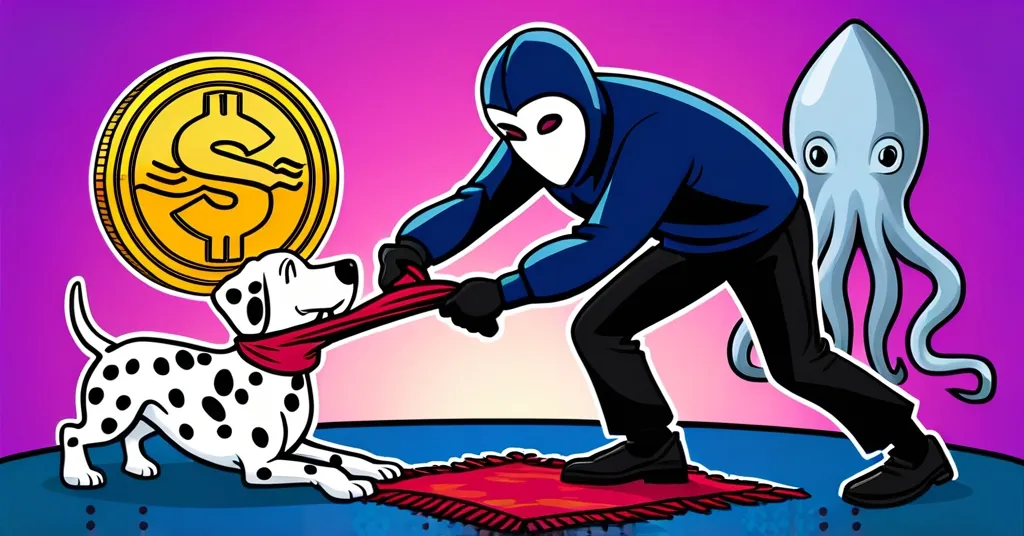Squid Game Season 2 Tackles Crypto Scams: Dalmatian Token Echoes Real SQUID Fraud

Squid Game Season 2 Takes a Bold Leap into Crypto Scams
The latest season of “Squid Game” delves into the murky world of cryptocurrency scams, with player 333, Lee Myeong-gi, revealed as a crypto influencer orchestrating a rug pull with the fictional Dalmatian (DAL) token. Amidst a backdrop of mixed fan reactions, the show eerily mirrors the real-world Squid Game (SQUID) token scam, highlighting the pervasive dangers in the crypto space.
- “Squid Game” Season 2 explores a crypto scam subplot.
- The fictional Dalmatian (DAL) token echoes the real-life SQUID token scam.
- Fans are divided over the new season’s direction.
The Fictional Scam
In “Squid Game” Season 2, the storyline introduces a gripping twist: Lee Myeong-gi, player 333, emerges not just as a participant but as a crypto influencer caught in the act of rug-pulling other players. A rug pull, in crypto slang, is when developers abandon a project and run off with investors’ funds, leaving them with worthless tokens. The fictional token at the center of this scam, Dalmatian (DAL), serves as a chilling reminder of the real-world crypto scams that have defrauded countless individuals.
As the season progresses, the narrative intertwines financial desperation with the allure of quick gains in the crypto world. Seong Gi-hun, our protagonist known as player 456, returns with a vengeance, seeking to dismantle the sinister game that has ensnared so many. His journey intersects with the crypto scam, adding a layer of modern financial peril to the already tense narrative.
Real-Life Parallels
The fictional Dalmatian (DAL) scam in “Squid Game” eerily mirrors the real-life Squid Game (SQUID) token scam that rocked the crypto world in October 2021. Developers launched the SQUID token, leveraging the show’s popularity to fuel a price surge. However, the token was designed with smart contracts rigged against buyers, leading to a collapse that left investors holding the bag after losing millions.
The sophistication of the SQUID scammers is noteworthy. They utilized decentralized exchanges and laundering services like Tornado Cash, which allowed them to obscure their tracks and exploit the openness of decentralized finance (DeFi). This real-life scam underscores the double-edged sword of DeFi, where the same openness that fosters innovation can also be exploited for malicious purposes.
Audience Reaction
“Squid Game” Season 2 has sparked a range of reactions among fans. On social media, many express disappointment, feeling that the season doesn’t capture the raw intensity and social commentary that made the first season a global phenomenon. “It’s like they tried to do too much,” one fan tweeted, reflecting a sentiment shared by many.
However, not all feedback is negative. Some viewers appreciate the show’s bold move to tackle the issue of crypto scams head-on. A crypto expert commented,
“While ‘Squid Game’ Season 2 might not thrill all fans, it’s a gutsy move to spotlight the rampant issue of crypto scams. It’s a wake-up call for the community.”
This perspective highlights the importance of raising awareness about such scams within the crypto ecosystem.
Broader Implications
The inclusion of the crypto scam subplot in “Squid Game” reflects broader themes of financial desperation and societal critique that the show has always explored. The narrative serves as a stark warning about the dangers of chasing quick gains in the volatile crypto market, where scams like rug pulls are all too common.
The openness of DeFi, while a boon for innovation, can also be a breeding ground for scams. The SQUID token scam thrived on a mix of pop culture hype and speculative fervor, a cautionary tale for investors navigating this wild west landscape. As Chris Janczewski, Head of Global Investigations at TRM Labs, noted,
“The SQUID scam demonstrates the complexity and real-world parallels of the scams depicted in ‘Squid Game.’ It’s a reminder of the importance of due diligence in the crypto space.”
The show’s attempt to weave these themes into its narrative underscores the need for greater awareness and education about crypto scams. As fans await the next season, they are left pondering how the crypto scam will further intertwine with Seong Gi-hun’s quest for justice.
Key Questions and Takeaways
- What is the main focus of “Squid Game” Season 2 regarding cryptocurrency?
The focus is on a character, Lee Myeong-gi, who is a crypto influencer involved in a rug pull with the fictional Dalmatian (DAL) token.
- How has the audience reacted to the second season of “Squid Game”?
The audience reaction has been mixed, with some fans expressing disappointment while others appreciate the new direction.
- What real-life event parallels the crypto scam depicted in “Squid Game”?
The real-life SQUID token scam, which defrauded investors of millions, mirrors the show’s fictional scam.
- Who is the protagonist of “Squid Game” and what is his motivation in Season 2?
Seong Gi-hun, known as player 456, seeks revenge against the game’s organizers, intertwining his quest with the crypto scam storyline.
While “Squid Game” Season 2 may have ruffled some feathers, it’s a bold move to spotlight the rampant issue of crypto scams. As we navigate the ever-evolving world of cryptocurrency, it’s crucial to stay vigilant and informed. Share your thoughts on the show or your experiences with crypto scams in the comments below!



